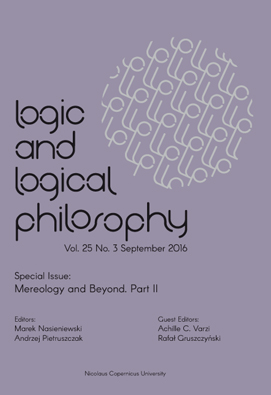Composition, identity, and emergence
DOI:
https://doi.org/10.12775/LLP.2016.010Keywords
, composition as identity, emergence, mereological nihilismAbstract
Composition as Identity (CAI) is the thesis that a whole is, strictly and literally, identical to its parts, considered collectively. McDaniel [2008] argues against CAI in that it prohibits emergent properties. Recently Sider [2014] exploited the resources of plural logic and extensional mereology to undermine McDaniel’s argument. He shows that CAI identifies extensionally equivalent pluralities – he calls it the Collapse Principle (CP) – and then shows how this identification rescues CAI from the emergentist argument. In this paper I first give a new generalized version of both the arguments. It is more general in that it does not presuppose an atomistic mereology. I then go on to argue that the consequences of CP are rather radical. It entails mereological nihilism, the view that there are only mereological atoms. I finally show that, given a mild assumption about property instantiation, namely that there are no un-instantiated properties, this argument entails that CAI and emergent properties are incompatible after all.References
Armstrong, D., 1978, A Theory of Universals: Universals and Scientific Realism, Cambridge: Cambridge University Press.
Baxter, B., and A. Cotnoir (eds.), 2014, Composition as Identity, Oxford: Oxford University Press. DOI: 10.1093/acprof:oso/9780199669615.001.0001
Bohn, E., 2012, “Monism, emergence and plural logic”, Erkenntnis, 76, 2: 211–223. DOI: 10.1007/s10670-011-9280-4
Bohn, E., 2014, “Unrestricted composition as identity”, pages 143–165 in [Baxter and Cotnoir, 2014] DOI: 10.1093/acprof:oso/9780199669615.003.0008
Boolos, G., 1984, “To be is to be the value of a variable (or to be some values of some variables)”, Journal of Philosophy, 81, 8: 430–449. DOI: 10.2307/2026308
Cotnoir, A., 2013, “Composition as general identity”, Oxford Studies in Metaphysics, 8: 294–322. DOI: 10.1093/acprof:oso/9780199682904.003.0007
Cotnoir, A., 2014, “Composition as identity. Framing the debate”, pages 3–23 in [Baxter and Cotnoir, 2014]. DOI: 10.1093/acprof:oso/9780199669615.001.0001
Gruszczyński, R., and A. Pietruszczak, 2014, “The relations of supremum and mereological sum in partially ordered sets”, pages 123–140 in Mereology and the Sciences, C. Calosi and P. Graziani (eds.), Amsterdam, Springer. DOI: 10.1007/978-3-319-05356-1_6
Hovda, P., 2009, “What is classical mereology?”, Journal of Philosophical Logic, 38: 55–82. DOI: 10.1007/s10992-008-9092-4
Hovda, P., 2014, “Logical considerations on composition as identity”, pages 192–210 in [Baxter and Cotnoir, 2014]. DOI: 10.1093/acprof:oso/9780199669615.003.0010
Lewis, D., 1986, On the Plurality of Worlds, Oxford, Blackwell.
Lewis, D., 1991, Parts of Classes, Oxford, Blackwell.
McDaniel, K., 2008, “Against composition as identity”, Analysis, 68, 2: 128–133. DOI: 10.1093/analys/68.2.128
McKay, T.J., 2006, Plural Predication, Oxford University Press. DOI: 10.1093/acprof:oso/9780199278145.001.0001
McLaughlin, B., and K. Bennett, 2014, “Supervenience”, in The Stanford Encyclopedia of Philosophy (Spring 2014 Edition), E.N. Zalta (ed.) http://plato.stanford.edu/archives/spr2014/entries/supervenience/
Sider, T., “Parthood”, 2007, Philosophical Review, 116: 51–91. DOI: 10.1215/00318108-2006-022
Sider, T., 2014, “Consequences of collapse”, pages 211–221 in [Baxter and Cotnoir, 2014]. DOI: 10.1093/acprof:oso/9780199669615.003.0011
Simons, P., 1987, Parts. A Study in Ontology, Oxford, Clarendon Press.
Van Inwagen, P., 1994, “Composition as identity”, pages 207–220 in Philosophical Perspectives, J.E. Tomberlin (ed.), vol. 8 of “Logic and Language”, Ridgeview, Atascadero. DOI: 10.2307/2214171
Van Inwagen, P., 2006, “Can mereological sums change their parts?”, The Journal of Philosophy CIII, 12: 614–630. DOI: 10.1017/CBO9781107111004.013
Van Inwagen, P., 1990, Material Beings, Ithaca, Cornell University Press.
Varzi, A., 2016, “Mereology”, in The Stanford Encyclopedia of Philosophy (Spring 2016 Edition), E.N. Zalta (ed.). http://plato.stanford.edu/archives/spr2016/entries/mereology/
Varzi, A., 2014, “Formal theories of parthood”, page 359–370 in Mereology and the Sciences, C. Calosi and P. Graziani (eds.), Amsterdam, Springer.
Wallace, M., 2011, “Composition as identity. Part 1”, Philosophy Compass, 6/11: 804–816. DOI: 10.1111/j.1747-9991.2011.00431.x
Yi, B., 1999, “Is mereology ontologically innocent?”, Philosophical Studies, 93, 2: 141–160. DOI: 10.1023/A:1004274912342
Downloads
Published
How to Cite
Issue
Section
Stats
Number of views and downloads: 686
Number of citations: 2







